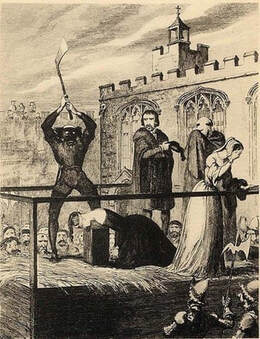In 1541, Catherine Howard, Henry VIII fifth wife, had begun a physical relationship (at least Jane thought she did) with one of his favourite courtiers, Thomas Culpepper, and Jane Boleyn went out of her way to encourage this relationship.
Catherine wrote to Culpepper in a letter that was to be all their undoing:
“praying you that you will come when my Lady Rochford is here”
If Jane had anything to do with Anne’s downfall she must have realised that she was lucky to escape in 1536, and if she didn’t, then she doesn't seem to have learned anything from the whole affair. Jane must have known what would happen if Henry found out that she was involved with Catherine and Culpepper and when the affair was out in the open each woman blamed the other. Jane Boleyn walked right into the Culpepper affair with her eyes open.
Following their arrest, Jane was imprisoned in the Tower of London and Catherine Howard at Syon Abbey. The night before her execution, Catherine is said to have spent it practicing laying her head upon the block, and Jane was in the throes of a nervous breakdown.
Both women were beheaded with one blow of the executioner's axe and their bodies buried in the chapel of St. Peter ad Vincula.
I often asked myself the question, were Catherine, Jane and Anne's 'crimes' so appalling that they warranted a death sentence? That, I think made little difference, once they stood before the justices their fates were sealed, and state trials weren't fair trials. Schauer and Schauer in their article Law as an Engine of State wrote " Laws, like armies, were an engine of state, not a mechanism for justice!" and in that lies the answer.


 RSS Feed
RSS Feed
